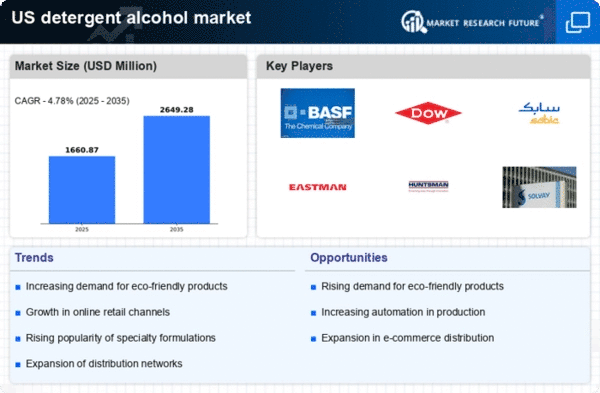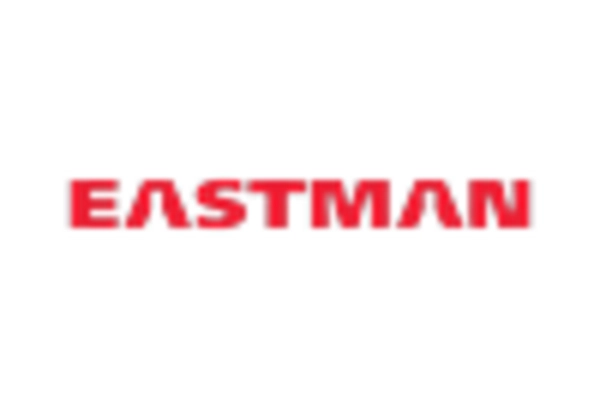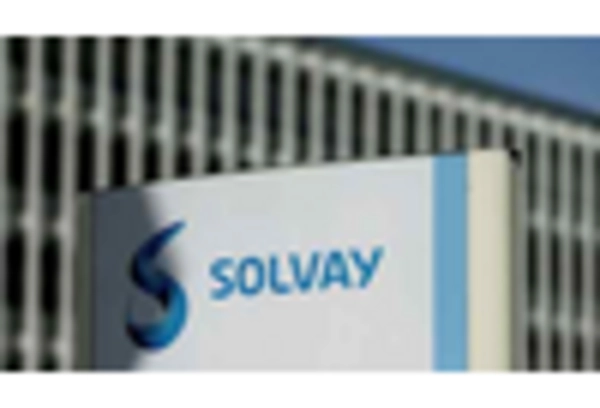Increased Industrial Applications
The detergent alcohol market is experiencing growth due to its expanding applications in various industrial sectors. Industries such as automotive, manufacturing, and food processing increasingly utilize detergent alcohol for cleaning and degreasing purposes. The versatility of detergent alcohol makes it suitable for a wide range of industrial cleaning tasks, contributing to its rising demand. Recent statistics suggest that the industrial cleaning market is projected to reach $25 billion by 2025, with detergent alcohol playing a crucial role in this growth. As industries continue to prioritize efficiency and cleanliness, the detergent alcohol market is likely to see sustained demand from these sectors, reinforcing its position within the broader industrial cleaning landscape.
Rising Demand for Cleaning Products
The detergent alcohol market experiences a notable surge in demand for cleaning products, driven by heightened consumer awareness regarding hygiene and cleanliness. This trend is particularly pronounced in residential and commercial sectors, where the need for effective cleaning solutions is paramount. According to recent data, the market for cleaning products in the US is projected to reach approximately $40 billion by 2026, with a significant portion attributed to detergent alcohol. The versatility of detergent alcohol in various applications, including surface cleaning and disinfection, further enhances its appeal. As consumers increasingly prioritize health and safety, The detergent alcohol market is likely to benefit from this growing demand. It positions itself as a key player in the broader cleaning products industry.
Shift Towards Online Retail Channels
The detergent alcohol market is witnessing a shift towards online retail channels. This shift significantly impacts consumer purchasing behavior. With the increasing penetration of e-commerce in the US, consumers are more inclined to purchase cleaning products online, including detergent alcohol. This trend is supported by data showing that online sales of cleaning products are expected to grow by 15% annually through 2025. The convenience of online shopping, coupled with the ability to compare products and prices, enhances consumer engagement in the detergent alcohol market. As retailers adapt to this shift by enhancing their online presence and offering competitive pricing, the detergent alcohol market is likely to benefit from increased visibility and accessibility, ultimately driving sales growth.
Technological Advancements in Formulations
Innovations in chemical formulations are transforming the detergent alcohol market, enabling the development of more effective and environmentally friendly products. Advances in technology allow manufacturers to create formulations that enhance cleaning efficiency while reducing harmful environmental impacts. For instance, the introduction of bio-based detergent alcohols is gaining traction, appealing to eco-conscious consumers. The market is witnessing a shift towards products that not only clean effectively but also align with sustainability goals. This trend is supported by data indicating that the market for green cleaning products is expected to grow at a CAGR of 10% through 2027. As a result, the detergent alcohol market is poised to capitalize on these technological advancements, catering to a more discerning consumer base.
Consumer Preference for Multi-Functional Products
The detergent alcohol market is influenced by a growing consumer preference for multi-functional cleaning products. Consumers increasingly seek products that offer versatility, allowing them to tackle various cleaning tasks with a single solution. This trend is evident in the rising popularity of all-in-one cleaning products that incorporate detergent alcohol, appealing to time-conscious consumers. Market Research Future indicates that approximately 60% of consumers prefer products that serve multiple purposes, driving innovation in product development. As manufacturers respond to this demand by creating multi-functional formulations, the detergent alcohol market is likely to expand, catering to the evolving needs of consumers who value convenience and efficiency in their cleaning routines.
















